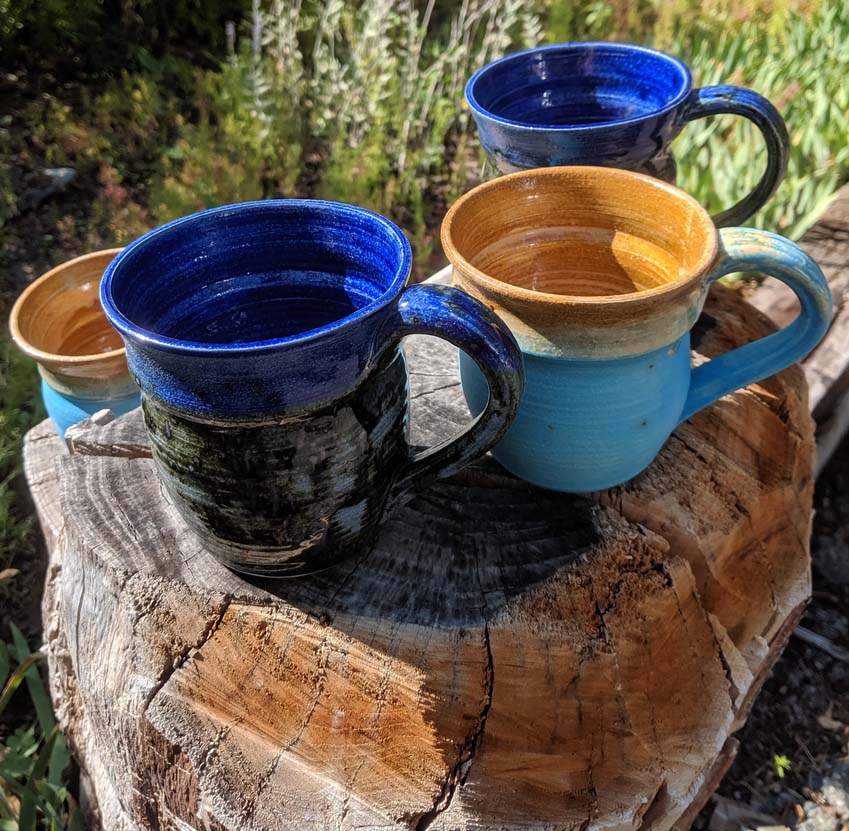 Mugs created by Father Theophan. Courtesy/Father Theophan
Mugs created by Father Theophan. Courtesy/Father Theophan
By FATHER THEOPHAN
Rector of Saint Job of Pochaiv Orthodox Church
Today I opened a glaze firing. The feeling is almost Christmas morning from my distant childhood. Nervous anticipation overtakes me as, still clad in bathrobe and sneakers hurriedly slipped over bare feet, I steal out of the house at 6 a.m. in near darkness to see if the kiln is cool enough to open.
First, I wave my hand over the vent, warm, but not painful. Then the paper test. I place a small piece of newsprint over the vent and wait, no burning, no browning. The temperature is under “Fahrenheit 451.” I only remember because of the book’s name. I confess, I haven’t read it.
Under 500 degrees, most of the thermal shock that a pot takes has already taken place. If, when the kiln is open, the potter hears “pinging,” a sound like tiny pieces of glass breaking, it’s a really bad sign. It means the glaze and clay are still rapidly shrinking.
I opened the kiln in silence and listen. Nothing. I breathe a sigh of relief and check out my presents. The kiln gods have smiled upon the studio.
Okay, yes, I am a priest in the Orthodox Christian Church, and there is but one God, the Father the Almighty… But every potter is a bit superstitious about a firing.
There are just so many things that can go wrong. Granted proper planning, good materials, well-functioning equipment, and attentive execution mitigate much of the unknown, but it only goes so far.
Glazes run, kilns hiccup and don’t reach temperature, or reach temperature too quickly, air-bubbles lurk unseen to fill with steam and blow out the sides of pots.
And so, when a firing is successful, we tend to repeat the procedure that preceded it. I had all the handles of the mugs turned inward in the firing and everything turned out great, I had better always turn the mug handles in. It is scientific, logical thought applied to what might not be the applicable variables. But everyone does it, even down to lab-mice.
Superstition helps us to feel in control of a universe that is far too often out of our control. It brings, for good or ill, a sense of order to the chaos that swirls around us.
Superstition is both bad science and bad religion. I think, “When I do ‘X,’ ‘Y’ happens. I should do ‘X’ more often to get ‘Y’” mistakenly inferring a causal relationship. Or I think, “When I do ‘X’ God will be pleased with me and give me ‘Y.’” Both of these are misguided. It rains on the just and the unjust alike, it doesn’t matter how we dance.
There is either a caring deity or there is not, it is a matter of faith. But superstitious belief in some sort of cosmic slot machine or ATM leads to awful theology and even worse treatment of our fellows.
People (and even our ideas on God) easily become means used to our ends when we imagine we have control.
I may whisper a “Thank you” as I open the kiln and see the high survival rate of my pottery, but I will not curse a capricious, omnipotent god if everything goes sideways.
So I prop open the kiln to get it to cool a bit faster, and I run back up to the house to wait for my wife to awaken so that we can empty the kiln together and share the joy of discovery.

